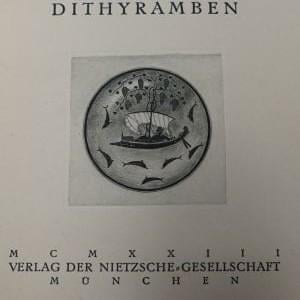
Among Daughters of the Desert (Dithyrambs of Dionysus) Friedrich Nietzsche
На этой странице вы найдете полный текст песни "Among Daughters of the Desert (Dithyrambs of Dionysus)" от Friedrich Nietzsche. Lyrxo предлагает вам самый полный и точный текст этой композиции без лишних отвлекающих факторов. Узнайте все куплеты и припев, чтобы лучше понять любимую песню и насладиться ею в полной мере. Идеально для фанатов и всех, кто ценит качественную музыку.

1
"Don't go!" said the wanderer who called himself Zarathustra's shadow. "Stay with us—otherwise our old dull affliction might seize us again.
That old magician has already given us his worst for our benefit, and behold, that good pious pope there has tears in his eyes and has again embarked on the sea of melancholy.
These kings here may still put on a pleasant countenance: but had they no witnesses, I wager that for them too the wicked game would recommence—
The wicked game of drifting clouds, of damp melancholy, of imposing skies, of stolen suns, of howling autumn winds—
The wicked game of our own howling and cries of distress: Stay with us, Zarathustra! Here there is much concealed misery that wants to speak, much evening, much cloud, much musty air!
You have nourished us with strong food for men and fortifying maxims: do not let the frail effeminate spirits seize us again for dessert!
You alone make the air around you strong and clear! Have I ever found such good air on earth than with you in your cave?
I have seen many lands, my nose has learned to test and assess many kinds of air: but with you my nostrils taste their greatest delight!
Unless, unless—oh forgive an old memory! Forgive me an old after-dinner song, which I once composed among the daughters of the desert.
For with them the air was equally good, clear, and oriental; never was I farther away from cloudy, damp, melancholy old Europe!
At that time I loved such Oriental girls and other blue skies, over which no clouds and no thoughts hung.
You would not believe how dutifully they sat there, when they were not dancing, deep, but without thoughts, like little secrets, like ribboned riddles, like after-dinner nuts—
Colorful and strange, forsooth! but without clouds: riddles that let themselves be guessed: for such girls I then conceived an after-dinner psalm."
Thus spoke the wanderer, who called himself Zarathustra's shadow; and before anyone answered him, he had already seized the harp of the old magician, crossed his legs and looked around, composed and wise: but with his nostrils he drew in the air slowly and inquiringly, as one tastes the new air in a foreign land. At last he began to sing with a kind of roar.
2
The desert grows: woe to him in whom deserts hide ...
3
Ha!
Solemn!
A worthy beginning!
Solemnly African!
Worthy of a lion
Or of a moral screaming monkey ...
— But nothing for you,
You most beloved maidens,
At whose feet I,
A European under palm trees,
Am allowed to sit. Selah.
"Don't go!" said the wanderer who called himself Zarathustra's shadow. "Stay with us—otherwise our old dull affliction might seize us again.
That old magician has already given us his worst for our benefit, and behold, that good pious pope there has tears in his eyes and has again embarked on the sea of melancholy.
These kings here may still put on a pleasant countenance: but had they no witnesses, I wager that for them too the wicked game would recommence—
The wicked game of drifting clouds, of damp melancholy, of imposing skies, of stolen suns, of howling autumn winds—
The wicked game of our own howling and cries of distress: Stay with us, Zarathustra! Here there is much concealed misery that wants to speak, much evening, much cloud, much musty air!
You have nourished us with strong food for men and fortifying maxims: do not let the frail effeminate spirits seize us again for dessert!
You alone make the air around you strong and clear! Have I ever found such good air on earth than with you in your cave?
I have seen many lands, my nose has learned to test and assess many kinds of air: but with you my nostrils taste their greatest delight!
Unless, unless—oh forgive an old memory! Forgive me an old after-dinner song, which I once composed among the daughters of the desert.
For with them the air was equally good, clear, and oriental; never was I farther away from cloudy, damp, melancholy old Europe!
At that time I loved such Oriental girls and other blue skies, over which no clouds and no thoughts hung.
You would not believe how dutifully they sat there, when they were not dancing, deep, but without thoughts, like little secrets, like ribboned riddles, like after-dinner nuts—
Colorful and strange, forsooth! but without clouds: riddles that let themselves be guessed: for such girls I then conceived an after-dinner psalm."
Thus spoke the wanderer, who called himself Zarathustra's shadow; and before anyone answered him, he had already seized the harp of the old magician, crossed his legs and looked around, composed and wise: but with his nostrils he drew in the air slowly and inquiringly, as one tastes the new air in a foreign land. At last he began to sing with a kind of roar.
2
The desert grows: woe to him in whom deserts hide ...
3
Ha!
Solemn!
A worthy beginning!
Solemnly African!
Worthy of a lion
Or of a moral screaming monkey ...
— But nothing for you,
You most beloved maidens,
At whose feet I,
A European under palm trees,
Am allowed to sit. Selah.
Комментарии (0)
Минимальная длина комментария — 50 символов.












